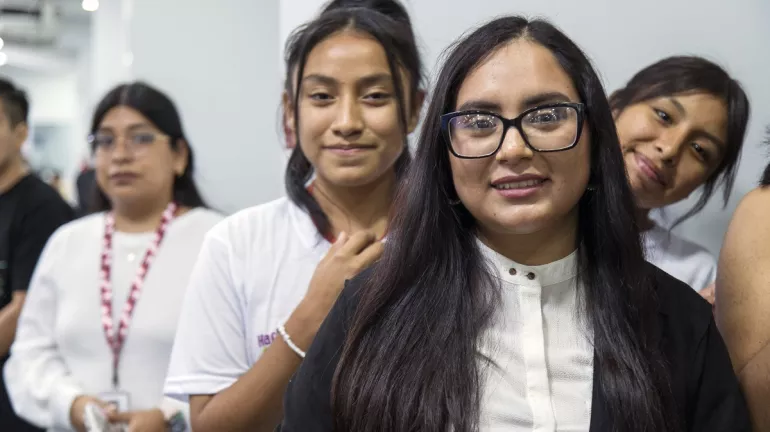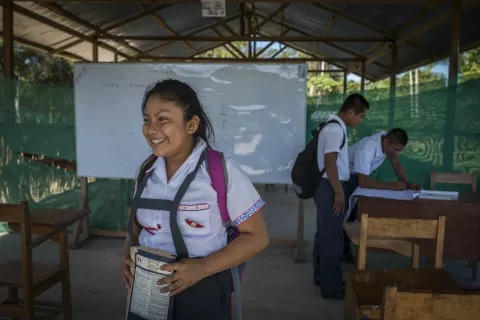Yesenia, age 19, is ready to go on stage. Her group of web programmers, Girls in Tech, is about to present their project at the #MásChicasTec (meaning #MoreTechGirls) Hacking Inequalities hackathon in Lima, Peru. Yesenia’s eyes glisten with pride and excitement. She can’t wait to go home and tell her mother, Betty, what she experienced tonight.
"Even though my mother doesn't fully understand what I'm studying, she supports me, and her support is enough," says Yesenia.
With her mother’s support, Yesenia has overcome multiple barriers, including stereotypes from her own family, that pigeonhole girls to the home or to a limited choice of careers.
Yesenia was born in Milpo, in the Andean region of Huánuco, Peru. At the age of 5, she arrived in Lima with her mother and attended primary school but soon, her education was interrupted. The difficult economic situation facing many Peruvian families and the absence of her own father, who had promised to finance her secondary school education, led Yesenia to find a job at age 13.
"I became a babysitter. It was hard work for someone my age," Yesenia says.
Yesenia did not lose sight of her goal, though. Members of her family told her she would not study again, but Yesenia says, “I wanted to show them that no matter how old I am, I will continue studying."
"I decided to go back to studying. I told myself that I can't stay stagnant. I have to dream and aspire to more. I have to finish what I started."
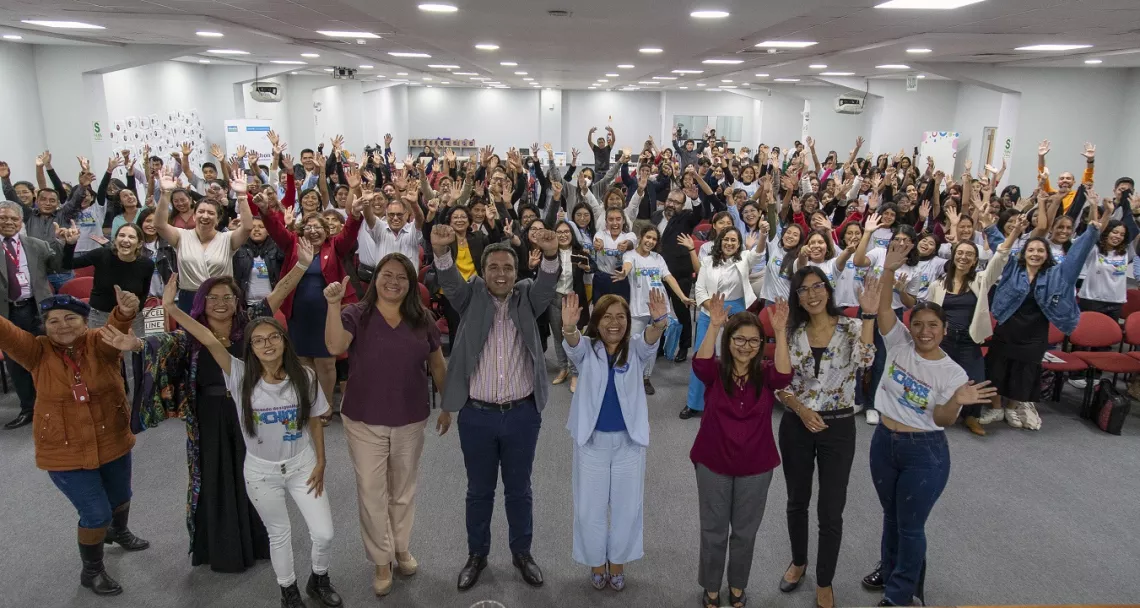
In 2020, Yesenia enrolled in the Center for Alternative Basic Education (CEBA) Manuel Scorza Torres in North Lima, to complete secondary schooling.
"Finishing high school makes me feel proud," Yesenia says between smiles. "When I see other students in this school, I get emotional because they remind me of what happened with many girls and to my own mother. She did not finish primary school because she only studied until third grade. I would have loved for her to return to school. I still tell her, Mom, you can study, too. I have companions at CEBA who are 46, 56 years old."
According to Peru’s National Demographic and Family Health Survey from 2022, 3.9 per cent of adolescent girls aged between 12 and 14 years old and 13.8 per cent of those between 15 and 19 years old have interrupted their studies due to early marriage or pregnancy. Of them, 43.6 per cent and 42.1 per cent, respectively, have interrupted their studies because of "economic and family reasons", partly due to the burden of domestic and care work.
When girls do not complete 12 years of quality education, it can impact the rest of their lives. They lose the chance to pursue further studies, secure fulfilling jobs, meet their social care needs, and achieve financial independence. In 2021, women made up 32.5 per cent of Peru’s unemployed population, while men made up less than half, 14.7 per cent. Moreover, more than 7 per cent of women who work, do so in the informal sector.
Yesenia learned about #MásChicasTec from her Science, Technology and Health teacher at CEBA Manuel Scorza in Lima. This UNICEF Skills4Girls programme seeks to reduce the digital gender gap and bring girls and adolescent women closer to fields of science, technology, engineering and mathematics (STEM). The digital gender gap is stark in Peru. According to the National Superintendency of Higher University Education (SUNEDU), 32% of graduates in STEM subjects are women in Peru, but only 8 per cent of programmers in the country are women. The lack of female role models in STEM careers further hinders girls’ progress and ambition in this area.
With encouragement from her Science, Technology and Health teacher at CEBA Manuel Scorza, Yesenia interviewed for #MásChicasTec virtually during the COVID-19 pandemic. She was accepted and offered a scholarship. This is how she started studying web programming at a Productive Technical Education Center in North Lima.
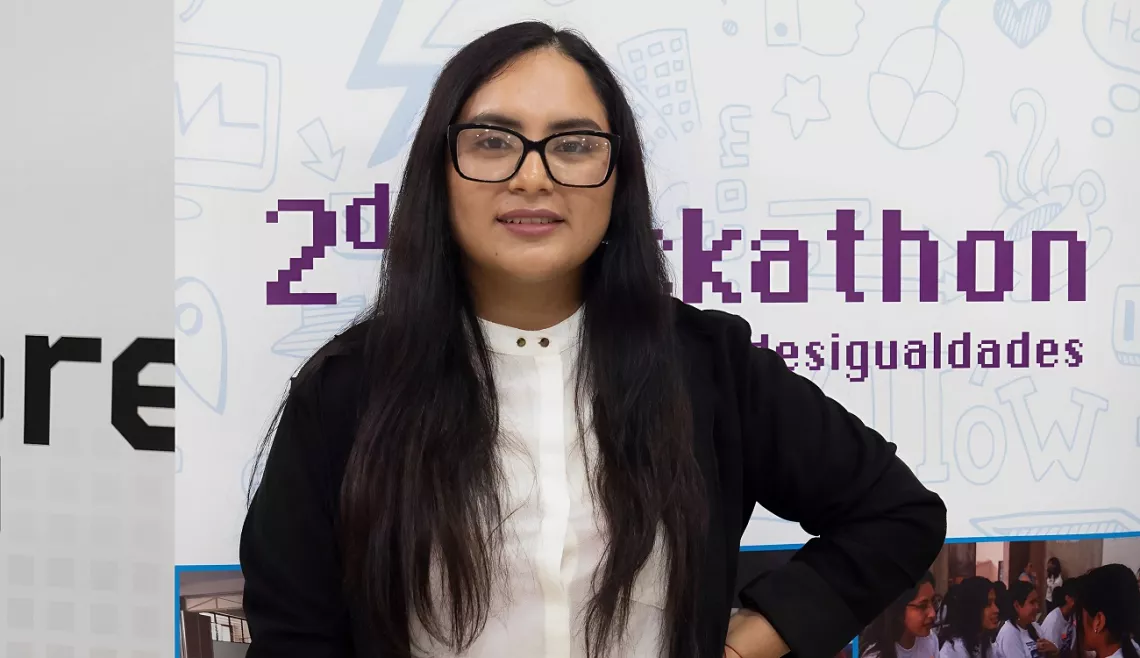
However, just as her future was finally looking brighter, Yesenia received some tragic news: her grandfather became critically ill.
"He was between life and death. We had to care for him, take him to the hospital, and get the medicine he needed," recalls Yesenia.
Consumed by the duty to care for her grandfather, Yesenia made the difficult decision to drop out of #MásChicasTec. Like Yesenia, girls and women carry an inordinate share of the care burden in Peru. In a public consultation conducted by UNICEF Peru, 86 per cent of respondents who said they were responsible for unpaid care and domestic work were adolescent girls. With 86.7 per cent of women respondents saying the same, the data indicates that the distribution of care and domestic work starts early in the lives of girls and prevails through adulthood.
"I used to think about pursuing nursing or cosmetology, which is usually expected for a woman in Peru. But thanks to this programming course, I discovered that I want to dedicate myself to programming regardless of what others say."
Yesenia did not give up.
“If I start it, I must finish it," she said to herself once more and entered the second cohort of #MásChicasTec. With this new group, Yesenia participated in the 2023 hackathon. Her team, which she named Girls in Tech, came up with an innovative solution to a challenge posed by Falabella.com, one of the 10 companies that supported Hacking Inequalities.
"We had to make improvements to a smartphone app. I loved being on the computer, working with the code and putting together the page, but it was very challenging because my team members had to juggle different schedules," says Yesenia.
To her elation, Yesenia’s project won the People's Choice Award in a virtual vote involving the hackathon participants and audience members who had tuned in via online streaming.
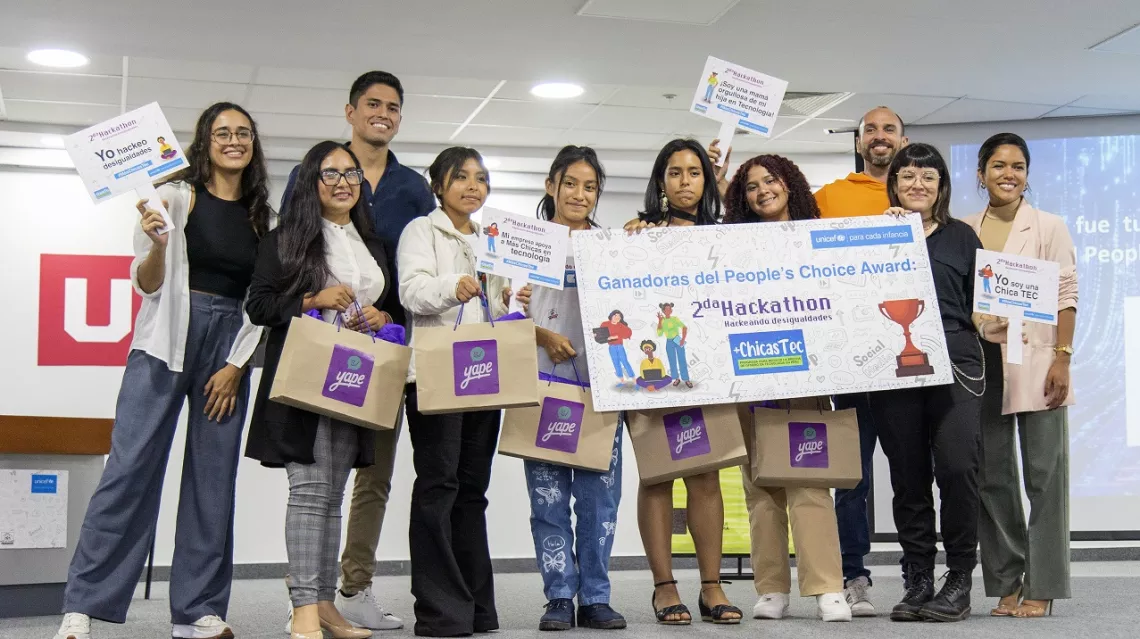
This year, Yesenia will complete her schooling, and already has plans for what will come next. Studying English is part of the plan. Yesenia believes it is important for her career, especially as she wants to one day travel to Canada.
"It is a country where I see opportunities. I want to grow professionally there and then return to Peru to help people far from Lima, in rural areas. I want to reach out to girls and tell them they can do it. I want to support them the way UNICEF supported me in my journey," says Yesenia.
Dayana, Yesenia's classmate at #MoreTechGirls,
tell us a little more about the programme:

